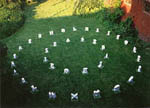
Texts out of
“The original Silence of the Word”:
Edition of 1990 about the sculptural group “All Number Language”
QUOTATIONS FROM “Silence, Mother of the Word”
BY HERWIG ARTS
What is marvellous about this sculpture lays in the fact that it brings tribute to the endless possibilities of the human word even though it is wrapped in a remarkable silence.
Letters and numbers can – when put in the most diverse combinations - assume a countless variety of significations. The potential depth of each one of these meanings always depends of the thoughtfulness or reflective silence that preceded it. Whereas the effect of a word can be measured by the significant silence that is the result of this word.
‘Where life is growing silence usually still reigns’. The Chinese proverb is well-known: “A falling tree makes a tremendous noise, but the growing of a wood is not heard.”
The spoken and written word has become so banal and misused in our mass media that it has almost become a synonym for “entertainment”, propaganda, lie or hollow phrase. That is why Wittgenstein was right when he described the task of the philosopher as “a healing of the language” ( speech therapy). To him philosophy was nothing else than “a critical investigation of language”. His method of curing consequently consisted of a kind of ascetic and sober use of language, in other words, in a kind of “periodical abstinence” of the word. Moreover this periods of silence have meant to him nothing more than “un recul pour mieux sauter”.
There is the well-known witticism of Wittgenstein: “About the things one cannot talk , one should keep silent”. And indeed what can not be spoken of unanimously, about those things
The difficulty for he who thinks about the phenomenon language lays in the fact that the only means man has to study language in depth is precisely language itself. When we reason about language, it can only happen by using language . Nevertheless
His work of art evokes for us the white virginity of the not yet written word, that is still open for so many fertilizing thoughts and turns of phrases. The artist is reflecting about what makes man becoming man: precisely language.
Three elements of language model the unique personality of each man: first of all the words that have ever been spoken to him; secondly the words he was permitted to speak (i.e. when he was listened to attentively and appreciatively) and thirdly the silence this man was able to put in, either to prepare his words, or to consider the words he heard elsewhere.
In his book “Language and Silence” G. Steiner proves that the works of Wittgenstein, Kafka, Rilke and the Dada-movement where in fact “an investigation into the importance of silence and into the borders of the legitimate or responsible use of language”. In other words about the question: when do we keep silence and when are we entitled to speak?
Nevertheless ,Wittgenstein also said (but many of his admirers keep this silent) “that one can only express oneself in a poetical way about the deeper things of life”. According to Wittgenstein “Poetry is the only possibility to make theology”. Also this word of the Austrian philosopher has become reality in the oeuvre of J. Lievens. -
Herwig Arts is professor Anthropology and Religion at the UFSIA in